By phone or email
To speak to an adviser, please call our free and confidential advice line 0808 801 0366 (Monday to Friday 9.30am to 3pm, excluding Bank Holidays). Or you can ask us a question via email using our advice enquiry form.
Are you a parent, kinship carer relative or friend of a child who is involved with, or who needs the help of, children’s services in England? We can help you understand processes and options when social workers or courts are making decisions about your child’s welfare.
Our advice service is free, independent and confidential.

To speak to an adviser, please call our free and confidential advice line 0808 801 0366 (Monday to Friday 9.30am to 3pm, excluding Bank Holidays). Or you can ask us a question via email using our advice enquiry form.
Our online advice forums are an anonymous space where parents and kinship carers (also known as family and friends carers) can get legal and practical advice, build a support network and learn from other people’s experiences.
Our get help and advice section has template letters, advice sheets and resources about legal and social care processes. On Monday and Thursday afternoons, you can use our webchat service to chat online to an adviser.

These pages share easy-to-follow information young parents may need if social workers become involved with their child. They answer questions young parents in that situation often have.
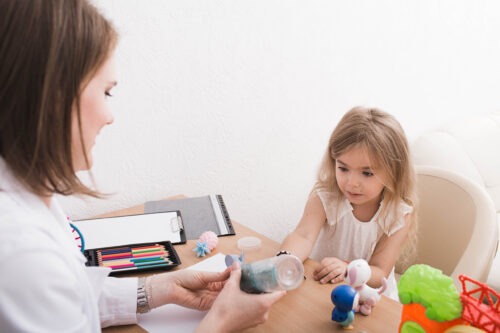
Children’s services used to be known as ‘social services’. Every local authority (council) has a children’s services department. They have two main roles. These are to support children and families and protect vulnerable children.
There are different ways children’s services can become involved with a child and their family. Some types of involvement are voluntary. This means children’s services and others provide help if the parent agrees. An example is child in need support.
But the law says if a child may be at risk of harm, children’s services must take steps to support or protect them. This is even if the parent or carer does not want that to happen. (See more information on this in the child protection section here).
Children’s services are organised differently in different areas. So, the way they do things and services available can vary.
The point of an assessment is to understand whether a child is safe, healthy and is being well looked after. And to find out what support the child and family might need.
This short film may be helpful to watch. It explains more about children’s services. And what parents should be able to expect if a social worker becomes involved in their child’s life.
After a family’s first contact with children’s services, sometimes their case may move to a different social work team. This depends on how children’s services are. Families can find a change of social worker upsetting. Especially if they have already spent time explaining everything to a previous social worker. So, when first coming into contact with children’s services it may be helpful to ask:
Parents should always be able to feel confident that any social worker involved understands their family’s situation.
When children’s services become involved with their child, young parents can sometimes feel that social workers are making all the decisions. And that they and their families are not really being given much say.
A family group conference can make it easier for families to be involved in making plans and decisions about their child.
A family group conference is a planning meeting led by the family and arranged by an independent person. The process ensures that families are at the centre of decision-making.
See our Family Group Conference: Advice for families page for information and advice. It includes films explaining what happens at a family group conference.
There is more detailed information explaining what children’s services and social workers do on our main Children's services page:
Our Children’s services page can help answer questions such as:
Our guides to working with social workers, advocates and solicitors may be useful if children’s services have, or may become involved with your child. These can all be found on Our top tips and templates page.
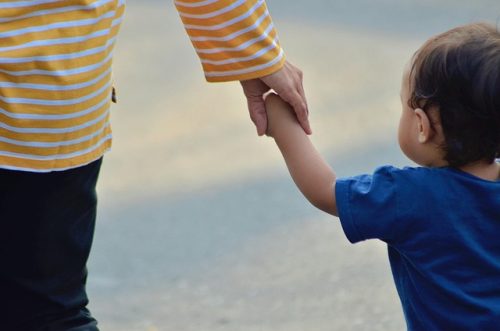
This is a general term. It is the actions, policies and procedures children’s services and other organisations put in place to keep children safe from significant harm. It includes steps to prevent and respond to abuse and neglect. Child protection is also sometimes called child safeguarding.
If children’s services are worried a child has been harmed, or is likely to suffer significant harm they must look into this. This is called making child protection enquiries. They have to do this by law.
Most child protection enquiries begin when children’s services receive information suggesting a child may not be safe and well cared for. This is known as a referral. Child protection enquiries can also be about an unborn child.
What do social workers mean when they talk about significant harm?
Government guidance describes four main types of harm:
Harm can include seeing or hearing someone else being harmed or abused. This could be a child seeing or hearing domestic abuse in the home for example.
Significant harm is about the level of harm a child is suffering. Or is likely to suffer. At this level of harm, children’s services can become involved in family life against the family’s wishes.
What does a child protection enquiry involve?
Through the child protection enquiry, the social worker will try to understand whether the child is being harmed. And what action is needed to keep the child safe. The social worker should aim to:
What is an initial child protection conference?
If a child is thought to be likely to suffer significant harm an initial child protection conference must take place. This is a type of meeting and is organised by children’s services.
The purpose of the meeting is for everyone present to look at all relevant information about the child’s situation. Information should include information from existing social work records. And information from enquiries that have been made before the conference.
The meeting will include:
It is important that parents understand:
What does a child protection conference decide?
The conference must decide if they think the child is likely to suffer significant harm in the future. If they do, they must:
This decision will depend on whether the conference thinks a child has suffered significant harm. Or if the conference thinks the child is likely to suffer significant harm in the future. The conference should have read and discussed all the relevant information to help decide this.
If the conference thinks a child has suffered significant harm (or is likely to) then:
What can help a young parent prepare for a child protection conference?
You can open or download our Tips for getting ready for a child protection conference. Before opening it up you may find it helpful to listen to someone talk through what a child protection conference is, what it can decide and then how you can use the tips to help you get ready for a conference – click here to listen.
And when you’re ready to go through the Tips, you may find it helpful to do this with a trusted friend, supporter or an advocate if you have one. But if it would be helpful to hear someone talking through the different tips then you can click here to listen.
Can a social work remove a child from their parent?
Many young parents feel scared that a social worker may take their child away. Social workers should always work with your family to keep your child safe and at home where possible.
Social workers cannot remove a child unless the Family Court has approved a plan for that to happen. Or unless someone with parental responsibility for your child has agreed that the social worker can arrange for your child to live somewhere else. For example, with another family member or in a foster home.
A child protection conference cannot remove a child from their parent.
Click here to watch our child protection conference film guides for parents show ‘Anne and Terry’s story’. This is not a real case but uses actors to show what happens when parents go to an initial child protection conference.
This film ‘If I could talk to me’ is for young parents going through the child protection process. It was developed by young parents and Just for Kids Law.
And see our Child protection page for more information.
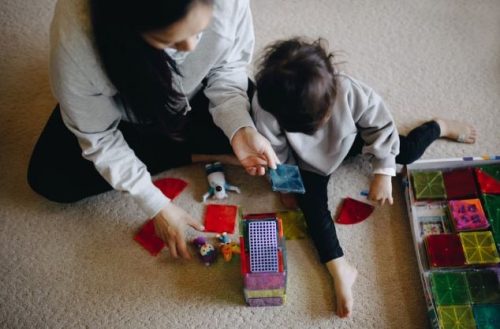
Pathway plans and the role of personal advisers explained:
Pathway plan:
A pathway plan is a legal document. It must be drawn up by children’s services once a looked after child becomes 16 (or after if they come into care after turning 16). The pathway plan should set out:
A pathway plan should include enough detail so that it can be used to see whether a young person’s goals are being met. The law says children’s services departments must provide any support or services included in the plan.
Personal adviser:
A personal adviser is someone who provides advice, support and practical help to certain young people aged 16 or above who have left, or are getting ready to, leave care. A personal adviser should:
It is important for social workers to look at how any plans they make to help or protect a child link with their parent’s pathway plan. Here are some examples of how this can be done:
Information and support
You and your child’s social worker should discuss all the people who have been involved in your life who may be able to provide important and helpful information or who could be part of a plan to support you to safely care for your child. This could include:
As soon as plans start to be made for your child, these people should have the opportunity to be included in discussions about what support they can provide.
Managing money
A personal adviser should make sure the pathway plan is updated to include details of how new costs relating to the child will be managed. This could include:
A place to live
The social worker and personal adviser should make sure the accommodation provides, or has helped to secure, is also suitable for your child to live in.
If it isn’t suitable, then it’s important for the child’s social worker to explain about what suitable accommodation would be. Both should cooperate to help you find suitable accommodation (within the right timescale) for you and your child.
Education, employment, training:
You should have support from your personal adviser about how the plans in place for your education, employment and training (such as going to college, working, doing an apprenticeship) might be affected by your becoming a parent. And what help you need to make any changes.
This information should be shared with your child’s social worker. For example, finding out whether your college has a crèche and how much this might cost.
It is important to think about whether you are getting all of the help and support that you need to keep your child safely with you. A checklist can be a good way of thinking through all of the different issues.
You can download this checklist to help you focus, and think through, some of the important issues. You can also use the checklist to help you get ready to talk through things with your child’s social worker and your personal adviser if you have one.
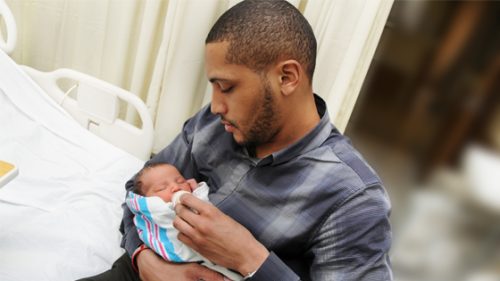
Mothers have parental responsibility from the moment their child is born. This is not true for all fathers though. But there are six different ways that a father may have or get parental responsibility.
Some fathers will have parental responsibility already because of marriage. Or because they are named on their child’s birth certificate. Other fathers can get parental responsibility in the ways shown in the picture below. The best option will depend on the precise situation.
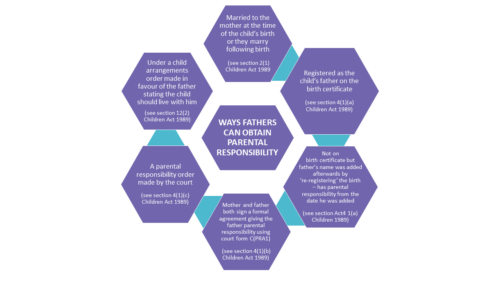
There is more detailed information and advice on our main Fathers page. This includes more detailed information about parental responsibility.
The law and guidance on what children’s services must do to support children and keep them safe, says they should work ‘in partnership’ with parents. This includes birth fathers who have parental responsibility and birth fathers who do not.
So, children’s services should invite you to meetings about your child, including child protection conferences, even if you don’t have parental responsibility.
It is very important that your child’s social worker always knows how to contact you.
Sometimes, young fathers’ details are not recorded or kept up to date on social work files. This means fathers can be overlooked or not contacted when important decisions and plans are being made about their children.
Children’s services should be looking at what help is needed to keep your child safe and supported within the family. They should do this whether or not you have parental responsibility.
But sometimes young fathers sometimes feel their own family are overlooked when children’s services are supporting or making plans for their child.
Sometimes young fathers are seen as a ‘risk’ to their child rather than as a ‘resource’ to support and help their child.
If you feel you are being seen only as a risk rather than someone who has something to contribute to your child’s life, here are some simple steps you can take that might help:
Listen carefully to what the social worker has said
Have you understood what they are worried about? If not, you can draw up a list of questions that you have and ask to meet the social worker to go through them. You could ask a family member or trusted friend to help you to do this. Or can make a voice note to remind you.
Think carefully about whether you feel the social worker is missing some information about your situation
Does the social worker have all the information they need to understand your situation fully? If not, make a list of the things you would like the social worker to know and understand about you.
Are there any others you have been working with who might be able to provide up-to-date information about you or your situation? For example, a mentor, a tutor, a probation worker, your child’s nursery worker, a support worker. If there is, ask this person if they would be happy to speak with the social worker. You can also ask if they could write a letter about you for the social worker.
Think about what help you need
If you feel you need help with a particular problem or challenge that you face, it’s also a good idea to make a note of the kind of help you think would be useful. Talk to the social worker about how you can find this help and what they can do to support you in getting it. If you’d like information about parenting classes or fathers’ groups ask the social worker for a list of what there is locally in your area.
If there are concerns about whether there has been domestic abuse between you and a partner (or ex-partner), it’s very important to take steps to fully understand what the concerns are. And to understand what is meant by domestic abuse. You can talk to the social worker or ring a specialist advice line. Or ask to be referred to a course about domestic violence. You can find more information on our Domestic Abuse page.
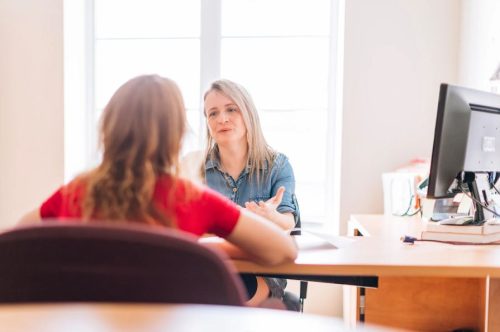
But if children’s services think the Family Court needs to:
they will apply to start care proceedings.
If a social worker has said children’s services want to begin care proceedings it is very important to get legal advice.
Can parents get free legal advice during care proceedings?
A parent who has parental responsibility for their child is automatically part of care proceedings. This is called being a party. A parent in this situation can access legal aid to cover the cost of a solicitor to advise and represent them in the care proceedings. It can also be used to instruct a barrister to advise and represent them at court.
Legal aid is the use of government money to pay for people to receive legal advice and representation.
Any other person with parental responsibility for a child subject to care proceedings is entitled to this type of legal aid too.
A parent who does not have parental responsibility, they won’t automatically be part of the care proceedings. For example, an unmarried father who is not named on their child’s birth certificate.
But a parent in this situation should receive notice that care proceedings have been issued (started). They can then usually be ‘joined as a party’ to the care proceedings by the court. And will then be able to access the same type of legal aid.
How can a parent find a solicitor?
It is important to find a solicitor who is a specialist in children law. Or who has Children Law Accreditation. To find a solicitor, a parent can use the ‘how to find a solicitor’ function on the Law Society website.
What are the main stages in care proceedings?
It is important to know what will happen during care proceedings. Easy to follow information about each of the main stages is available here.
See our Care (and related) proceedings page for more information. This includes answers to Ten big questions about care proceedings.
Explore blogs, vlogs and films from young parents about working with children’s services. Their experiences and insights may help other young parents. And help practitioners working with them.

Your donation will help more families access expert legal advice and support from Family Rights Group.
Donate Now